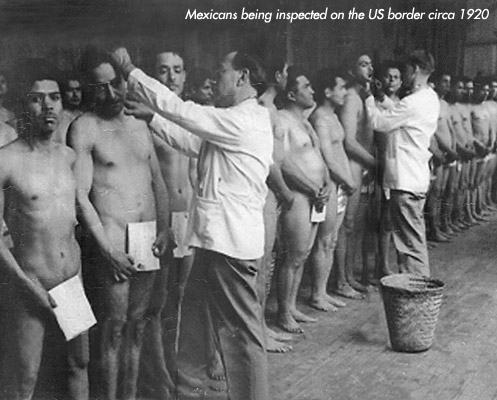How America inspired the Third Reich
The Nazis learned about Zyklon B from the US treatment of Mexicans

A free daily email with the biggest news stories of the day – and the best features from TheWeek.com
You are now subscribed
Your newsletter sign-up was successful
A brilliant new book by a Mexican-American historian documents how, in the Twenties and Thirties, the Nazis were inspired by what the United States had been doing to their Mexican neighbours since 1917.
In Ringside at the Revolution: An Underground Cultural History of El Paso and Juarez, David Dorado Romo establishes the US Immigration Department's systematic brutality along the Rio Grande border.
Mexican visitors were forced to strip naked and subjected to 'screening' (for homosexuality, low IQ, physical deformities like 'clubbed fingers') and to 'disinfection' with various toxic fumigants, including gasoline, kerosene, sulfuric acid, DDT and, after 1929, Zyklon-B (hydrocyanic acid) - the same gas used in the Holocaust's death camps.
The Week
Escape your echo chamber. Get the facts behind the news, plus analysis from multiple perspectives.

Sign up for The Week's Free Newsletters
From our morning news briefing to a weekly Good News Newsletter, get the best of The Week delivered directly to your inbox.
From our morning news briefing to a weekly Good News Newsletter, get the best of The Week delivered directly to your inbox.
The ostensible reason for the US fumigation was the fear of a typhus epidemic. Yet in 1916, the year before such 'baths' were enforced, only two cases of typhus had occurred in the poorest El Paso slum.
"This is a huge black hole in history," Romo told me. "Unfortunately, I only have oral histories and other anecdotal evidence about the harmful effects of the noxious chemicals used to disinfect and delouse the Mexican border crossers - including deaths, birth defects, cancer, etc. It may well go into the tens of thousands. It's incredible that absolutely no one, after all these years, has ever attempted to document this."
What Romo does have is shocking proof of the influence of US immigration techniques on Nazi thinking. Romo (below) quotes Hitler writing in 1924, "The American union itself... has established scientific criteria for immigration... making an immigrant's ability to set foot on American soil dependent on specific racial requirements on the one hand as well as a certain level of physical health of the individual himself."In 1938, three years before the first death camps of the Final Solution, Nazi chemist Dr Gerhard Peters published a full account, in German science journal Anzeiger fur Sahahlinskund, of the El Paso 'disinfection' plant. He included two photos and diagrams of the machinery which sprayed Zyklon B on railroad cars. (Peters went on to acquire Zyklon B's German patent.)
It should be noted that while the Americans sprayed their victims with toxic chemicals, they restricted use of Zyklon B to freight and clothes. As the Nazis understood, spraying it directly on a human caused almost immediate death. We can only guess what effect it had on the thousands of Mexican men, women and children who, after a 'bath' in DDT or gasoline, were sent away in clothes drenched with Zyklon B.
A free daily email with the biggest news stories of the day – and the best features from TheWeek.com
Romo's book comes at a time when Mexican immigration is at the top of the list of US political issues. There are 12m illegals in the United States by official count, and certainly twice that unofficially. Among the solutions is the right wing's vociferous call to build a 'Berlin wall' 2,000 miles long across the entire Rio Grande border.
Unsurprisingly, Mexican Americans hate this idea. Their memories - the emerging truth of Mexican-American history - and their votes seem certain to undermine it.
Ringside at the Revolution: An Underground Cultural History of El Paso and Juarez is published by Cinco Puntos Press.
-
 El Paso airspace closure tied to FAA-Pentagon standoff
El Paso airspace closure tied to FAA-Pentagon standoffSpeed Read The closure in the Texas border city stemmed from disagreements between the Federal Aviation Administration and Pentagon officials over drone-related tests
-
 Political cartoons for February 12
Political cartoons for February 12Cartoons Thursday's political cartoons include a Pam Bondi performance, Ghislaine Maxwell on tour, and ICE detention facilities
-
 Arcadia: Tom Stoppard’s ‘masterpiece’ makes a ‘triumphant’ return
Arcadia: Tom Stoppard’s ‘masterpiece’ makes a ‘triumphant’ returnThe Week Recommends Carrie Cracknell’s revival at the Old Vic ‘grips like a thriller’
-
 Epstein files topple law CEO, roil UK government
Epstein files topple law CEO, roil UK governmentSpeed Read Peter Mandelson, Britain’s former ambassador to the US, is caught up in the scandal
-
 Iran and US prepare to meet after skirmishes
Iran and US prepare to meet after skirmishesSpeed Read The incident comes amid heightened tensions in the Middle East
-
 Israel retrieves final hostage’s body from Gaza
Israel retrieves final hostage’s body from GazaSpeed Read The 24-year-old police officer was killed during the initial Hamas attack
-
 China’s Xi targets top general in growing purge
China’s Xi targets top general in growing purgeSpeed Read Zhang Youxia is being investigated over ‘grave violations’ of the law
-
 Panama and Canada are negotiating over a crucial copper mine
Panama and Canada are negotiating over a crucial copper mineIn the Spotlight Panama is set to make a final decision on the mine this summer
-
 Why Greenland’s natural resources are nearly impossible to mine
Why Greenland’s natural resources are nearly impossible to mineThe Explainer The country’s natural landscape makes the task extremely difficult
-
 Iran cuts internet as protests escalate
Iran cuts internet as protests escalateSpeed Reada Government buildings across the country have been set on fire
-
 US nabs ‘shadow’ tanker claimed by Russia
US nabs ‘shadow’ tanker claimed by RussiaSpeed Read The ship was one of two vessels seized by the US military